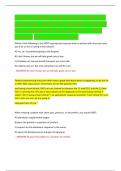Fisdap Cardiology EXAM 2024 AND PRACTICE
QUESTIONS |ACCURATE ANSWERS| VERIFIED
FOR GUARANTEED PASS |GRADED A |NEW
VERSION WITH 150 QUESTIONS
Which of the following is the MOST appropriate response when a patient with chest pain asks
you if he or she is having a heart attack?
A) Yes, so I recommend going to the hospital.
B) I don't know, but we will take good care of you.
C) Probably not, but we should transport you to be safe.
D) I believe you are, but only a physician can tell for sure.
- ANSWERS-B) I don't know, but we will take good care of you.
Patients experiencing chest pain often have a good idea about what is happening, so do not lie
or offer false reassurance. Conversely, do not tell patients they
are having a heart attack; EMTs are not trained to interpret the 12-lead ECG, and the 12-lead
ECG is currently the only way a heart attack can be diagnosed in the prehospital setting. If
asked, "Am I having a heart attack?", an appropriate response would be "I don't know for sure,
but in case you are, we are going to
take good care of you."
When treating a patient with chest pain, pressure, or discomfort, you should FIRST:
A) administer supplemental oxygen
B) place the patient in a position of comfort.
C) request an ALS ambulance response to the scene.
D) assess the blood pressure and give nitroglycerin.
- ANSWERS-B) place the patient in a position of comfort.
,An important aspect of treating a patient with chest pain, pressure, or discomfort is to ensure
that the patient is in a comfortable position. Most of the time,
the patient will already be in this position upon your arrival. A comfortable position will help
minimize anxiety, which in turn decreases cardiac oxygen
consumption and demand. The decision to administer supplemental oxygen depends on the
patient's oxygen saturation and/or whether or not respiratory
distress is present. Following your assessment, if you feel that ALS support is needed, you
should request it. If the patient has prescribed, unexpired
nitroglycerin; the systolic blood pressure is greater than 100 mm Hg; and the patient has not
taken the maximum of three doses, you should contact medical
control to obtain permission to assist the patient in taking the nitroglycerin.
The MOST important initial treatment for a patient whose cardiac arrest was witnessed is:
A) defibrillation.
B) cardiac drug therapy.
C) rapid transport.
D) high-quality CPR
. - ANSWERS-D) high-quality CPR.
Regardless of whether a patient's cardiac arrest is witnessed or unwitnessed, the single most
important initial treatment is high-quality CPR. Delays in
performing CPR have been clearly linked to poor patient outcomes. After CPR has been
initiated, apply the AED as soon as it is available. Cardiac drug therapy
may enhance the patient's chance of survival. There is evidence suggesting that transport to the
hospital with CPR in progress does not improve survival;
resuscitation at the scene may be more beneficial for the patient; follow your local protocols
and current research trends. Minimally interrupted, highquality
CPR, however, is clearly linked to good patient outcomes.
, In addition to chest pain or discomfort, a patient experiencing an acute coronary syndrome
would MOST likely present with:
A) ashen skin color, diaphoresis, and anxiety.
B) severe projectile vomiting and flush ed skin.
C) irregular breathing and low blood pressure.
D) profound cyanosis, dry skin, and a headache.
- ANSWERS-A) ashen skin color, diaphoresis, and anxiety.
Chest pain, pressure, or discomfort is the most common symptom of acute coronary syndrome
(ACS; eg, unstable angina, acute myocardial infarction); it
occurs in approximately 80% of cases. Patients with ACS are usually anxious and may have a
feeling of impending doom. Nausea and vomiting are common
complaints; however, projectile vomiting, which is typically associated with increased
intracranial pressure, is uncommon. The skin is often ashen gray and
clammy (diaphoretic) because of poor cardiac output and decreased perfusion. Less commonly,
the patient's skin is cyanotic. Respirations are usually
unlabored unless the patient has congestive heart fai lure, in which case respirations are rapid
and labored; irregular breathing, however, is not common.
Blood pressure may fall as a resu lt of decreased cardiac output; however, most patients will
have a normal or elevated blood pressure. If the patient
complains of a headache, it is usually a side effect of the nitroglycerin he or she took before
your arrival; ACS itself usually does not cause a headache.
A 49-year-old woman presents with a headache, nausea, and ringing in her ears. She is
conscious and alert and states that she has
hypertension and type 2 diabetes. Her BP is 202/114 mm Hg, her pulse is 60 beats/min, and her
respirations are 16 breaths/min. What
should you do?
A) Place her in a supine position.
B) Give her one tube of oral glucose.




